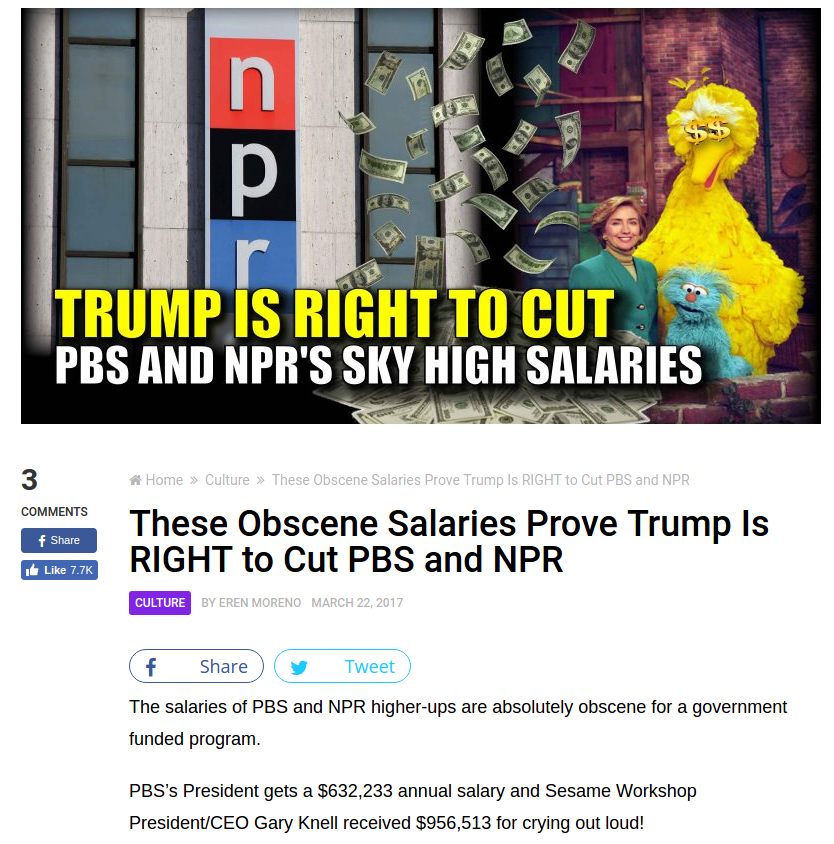The NPR budget and federal spending – Opinion piece
I wrote this up in response to something someone shared on Facebook (silly, I know) but I was curious to have some facts on what the numbers are. I’m reproducing some of the content from the shared page for context, and because giving them clicks seems counter to my point:

Anyway, below is what I wrote about it. Note that I didn’t actually post this on public Facebook, but I did send it to the sharer. Sources provided where relevant, but nothing was too rigorously vetted. BEWARE: opinions and not science follow!!
NPR received 14% of it’s 2015 operating budget from government grants at all levels (only 9% I can verify are from Federal grants; Fig. 1, npr-finances]. The NPR operating budget in FY 2015 was ~198 million [p. 30, npr-fy15], and so let’s say that conservatively, no more than 28 million came from the Federal budget. The Federal budget in 2015 was 3.7 trillion; over half (62%) of this is required spending (social security, healthcare, interest on debt), but the remaining budget (1.2 trillion) went to discretionary spending [cbo-discretionary]. This is where NPR’s budget “lives”; note that NPR actually don’t get federally marked funds, but instead receive Federal funds through grants from the Corporation for Public Broadcasting.
28 million out of 1.2 trillion is about 0.0023% of the Federal discretionary budget that went to NPR in 2015. NPR estimates they reach 45 million unique and regular listeners [npr-listeners, of course this is hard to verify…] which means that of ~320 million Americans us-census about 1 out of every 7 listens to NPR each month. This is at a cost to the Federal government of $0.62 per listener per year, or a burden on the American tax payer (averaged) of ~$0.12 per year (243 million pay taxes, gov-payers).
The Federal discretionary budget sent 582 billion to Defense spending in 2015. That’s just under half of the entire Federal discretionary budget. The number is even larger when you consider defense “related” expenses [wiki-military]. Averaging the same way as above, this means a burden of ~$2,395 on the American tax payer. I obviously recognize that some pay more, many pay less, but I’m just trying to make an argument about disparity in the order of magnitude of these numbers. I won’t go on here, because it’s hard to make an argument about defense spending efficiency with facts because 1) they tend to be obfuscated by the reporting agencies, and 2) the facts are extremely complex and I’m far from an expert.
The Federal agencies that support arts and sciences (e.g., NPR, NEA, NSF, NASA, NIH) make Americans smarter and cost mere pennies on the dollar that is given to other portions of the government operating budget. You can do a similar exercise to what I did above for NPR to any of these organizations and the story is the same. NPR educates and entertains Americans on a wide range of subjects, the NEA provides culture and dignity to cities around the country, the NSF supports cutting edge research in engineering, physics, math, psychology, Earth science, and more at institutions across the country that ultimately leads to technology which improves the lives of every American, NASA does the same and arguably leads the world in space exploration and planetary science, and the NIH funds research on all living things that makes us healthier and happier people every day. I implore you, don’t look to non-profits supporting the arts and sciences in an effort to curb federal spending (which I support by the way), when these organizations are generally efficient by pure necessity, and they provide immense benefits to the millions of individuals that comprise our great Nation.
